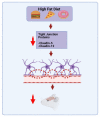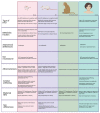The Effect of High Fat Diet on Cerebrovascular Health and Pathology: A Species Comparative Review
- PMID: 34199898
- PMCID: PMC8200075
- DOI: 10.3390/molecules26113406
The Effect of High Fat Diet on Cerebrovascular Health and Pathology: A Species Comparative Review
Abstract
In both humans and animal models, consumption of a high-saturated-fat diet has been linked to vascular dysfunction and cognitive impairments. Laboratory animals provide excellent models for more invasive high-fat-diet-related research. However, the physiological differences between humans and common animal models in terms of how they react metabolically to high-fat diets need to be considered. Here, we review the factors that may affect the translatability of mechanistic research in animal models, paying special attention to the effects of a high-fat diet on vascular outcomes. We draw attention to the dissociation between metabolic syndrome and dyslipidemia in rodents, unlike the state in humans, where the two commonly occur. We also discuss the differential vulnerability between species to the metabolic and vascular effects of macronutrients in the diet. Findings from animal studies are better interpreted as modeling specific aspects of dysfunction. We conclude that the differences between species provide an opportunity to explore why some species are protected from the detrimental aspects of high-fat-diet-induced dysfunction, and to translate these findings into benefits for human health.
Keywords: cardiovascular health; cerebrovasculature; cognition; high-fat diet; metabolism; species differences.
Conflict of interest statement
The authors declare no conflict of interest.
Figures




Similar articles
-
A Systematic Review of Animal Models of NAFLD Finds High-Fat, High-Fructose Diets Most Closely Resemble Human NAFLD.Hepatology. 2021 Oct;74(4):1884-1901. doi: 10.1002/hep.31897. Epub 2021 Jun 17. Hepatology. 2021. PMID: 33973269
-
Modeling insulin resistance in rodents by alterations in diet: what have high-fat and high-calorie diets revealed?Am J Physiol Endocrinol Metab. 2018 Mar 1;314(3):E251-E265. doi: 10.1152/ajpendo.00337.2017. Epub 2017 Nov 7. Am J Physiol Endocrinol Metab. 2018. PMID: 29118016 Review.
-
Effects of dietary n-3 PUFA levels in early life on susceptibility to high-fat-diet-induced metabolic syndrome in adult mice.J Nutr Biochem. 2021 Mar;89:108578. doi: 10.1016/j.jnutbio.2020.108578. Epub 2020 Dec 31. J Nutr Biochem. 2021. PMID: 33388352
-
High-Fat-Diet Intake Enhances Cerebral Amyloid Angiopathy and Cognitive Impairment in a Mouse Model of Alzheimer's Disease, Independently of Metabolic Disorders.J Am Heart Assoc. 2016 Jun 13;5(6):e003154. doi: 10.1161/JAHA.115.003154. J Am Heart Assoc. 2016. PMID: 27412896 Free PMC article.
-
High fat diet for induced dyslipidemia and cardiac pathological alterations in Wistar rats compared to Sprague Dawley rats.Clin Investig Arterioscler. 2019 Mar-Apr;31(2):56-62. doi: 10.1016/j.arteri.2018.09.004. Epub 2018 Dec 24. Clin Investig Arterioscler. 2019. PMID: 30591270 English, Spanish.
Cited by
-
Lipids at the Nexus between Cerebrovascular Disease and Vascular Dementia: The Impact of HDL-Cholesterol and Ceramides.Int J Mol Sci. 2023 Feb 23;24(5):4403. doi: 10.3390/ijms24054403. Int J Mol Sci. 2023. PMID: 36901834 Free PMC article. Review.
-
Xanthohumol improves cognition in farnesoid X receptor-deficient mice on a high-fat diet.Dis Model Mech. 2022 Nov 1;15(11):dmm049820. doi: 10.1242/dmm.049820. Epub 2022 Nov 25. Dis Model Mech. 2022. PMID: 36353888 Free PMC article.
-
High-Fat Diet-Induced Renal Proximal Tubular Inflammatory Injury: Emerging Risk Factor of Chronic Kidney Disease.Front Physiol. 2021 Dec 7;12:786599. doi: 10.3389/fphys.2021.786599. eCollection 2021. Front Physiol. 2021. PMID: 34950058 Free PMC article. Review.
-
Constant light and high fat diet alter daily patterns of activity, feed intake and fecal corticosterone levels in pregnant and lactating female ICR mice.PLoS One. 2024 Nov 20;19(11):e0312419. doi: 10.1371/journal.pone.0312419. eCollection 2024. PLoS One. 2024. PMID: 39565751 Free PMC article.
-
Fat Consumption Attenuates Cortical Oxygenation during Mental Stress in Young Healthy Adults.Nutrients. 2023 Sep 14;15(18):3969. doi: 10.3390/nu15183969. Nutrients. 2023. PMID: 37764753 Free PMC article. Clinical Trial.
References
Publication types
MeSH terms
Grants and funding
LinkOut - more resources
Full Text Sources
Medical

